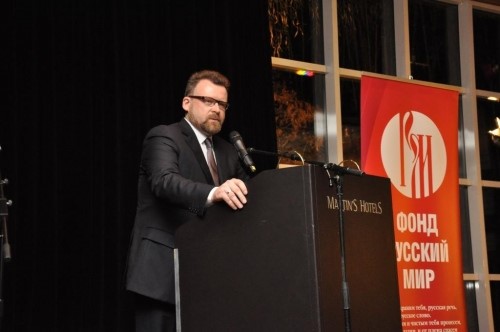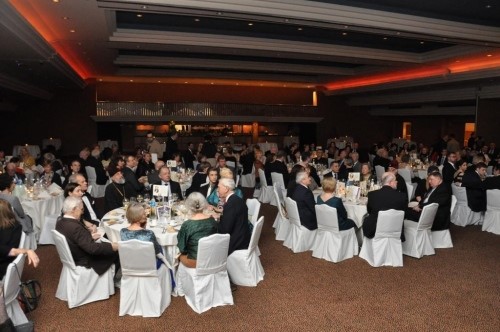On November 28, 2014, statuettes of the international “Russian Heritage” awards, supported by the Russkiy Mir Foundation and Rossotrudnichestvo, were presented for the fourth time in Chateau du Lac – a scenic ancient castle redeveloped into an modern five-star hotel in a suburb of Brussels.

The awards instituted in 2010 by the International Pushkin Foundation and European Russian Community Association are presented to people who make a considerable contribution to the preservation of the Russian spiritual and cultural heritage abroad as well as the development of partnership and cooperation between Belgium and European Union, on the one hand, and Russia, on the other hand. This year three traditional nominations have been complemented with another one – “For Preservation of the Russian Language” – specially established by the Russkiy Mir Foundation.
One distinction of the awards is its philanthropic nature. As always, this year all sponsorship donations and revenues from the ceremony will be used to purchase modern multifunctional medical beds for the children’s section of St. Petersburg Nikolai Petrov Oncology Scientific Research Institute. Founded by direct descendants of the great Russian poet, Alexandre and Macha Pouchkine (Pushkin), the International Pushkin Foundation has over the past 15 years been patronizing the children’s section of this well-known Russian clinic – a pioneer of Russian practical oncology, purchasing various medical equipment for this clinic each year.
The ceremony participants, whose number this year has exceeded 170 people, traditionally are philanthropists who contribute to the projects the International Pushkin Foundation’s projects, representatives of the general public, diplomatic and deputy corps, business and cultural circles. Among the guests were also participants of the round table “Russian World and Information Wars of 21st Century”, held on the same day in Brussels, with editors and publishers of Popular Internet resources of Russian compatriots participating.

The guests were greeted by Russian Ambassador to Belgium Alexander Romanov, the patron of the awarding ceremony. The attendees also saw a video address delivered by the head of Rossotrudnichestvo Konstantin Kosachev, who could not take part in the ceremony because of urgent state affairs.
The Russian Heritage award is a statuette molded from glass in the form of a tree with a lush crown and deep roots, epitomizing the inextricable connection between the present generation of Russians and the golden age of the Russian statehood. In 2014 the awards were presented to:
• well-known Belgian philanthropist Kami de Gans in the nomination “For Charity”;
• chairman of the Russian Heritage Conservation in Europe Foundation, Nicolas Belyavsky;
• president of the Belgian-Luxembourg Chamber of Commerce for Russia and Belarus, Arkady Arianoff, in the nomination “For Development of Bilateral Relations with Russia”.
The award of the Russkiy Mir Foundation “For Preservation of the Russian Language” was awarded by the jury to Professor of the University of Leuven Tatiana Soldatenkova. Advisor to the Foundation Board Chairman Anton Ilyin and Professor Vagemans said many warm words about the laureate, who made a great contribution to the opening and success of the Russian Center at this oldest and most prestigious European university.
The festive atmosphere was kept up through the night by the folklore group Kalinka from France, led by Misha Cherkassky. The night ended with the charity lottery draw, with prizes presented by the ceremony’s sponsors.
Source: Belgian Federation of Russian Organizations

 The awards instituted in 2010 by the International Pushkin Foundation and European Russian Community Association are presented to people who make a considerable contribution to the preservation of the Russian spiritual and cultural heritage abroad as well as the development of partnership and cooperation between Belgium and European Union, on the one hand, and Russia, on the other hand. This year three traditional nominations have been complemented with another one – “For Preservation of the Russian Language” – specially established by the Russkiy Mir Foundation.
The awards instituted in 2010 by the International Pushkin Foundation and European Russian Community Association are presented to people who make a considerable contribution to the preservation of the Russian spiritual and cultural heritage abroad as well as the development of partnership and cooperation between Belgium and European Union, on the one hand, and Russia, on the other hand. This year three traditional nominations have been complemented with another one – “For Preservation of the Russian Language” – specially established by the Russkiy Mir Foundation. The guests were greeted by Russian Ambassador to Belgium Alexander Romanov, the patron of the awarding ceremony. The attendees also saw a video address delivered by the head of Rossotrudnichestvo Konstantin Kosachev, who could not take part in the ceremony because of urgent state affairs.
The guests were greeted by Russian Ambassador to Belgium Alexander Romanov, the patron of the awarding ceremony. The attendees also saw a video address delivered by the head of Rossotrudnichestvo Konstantin Kosachev, who could not take part in the ceremony because of urgent state affairs.





